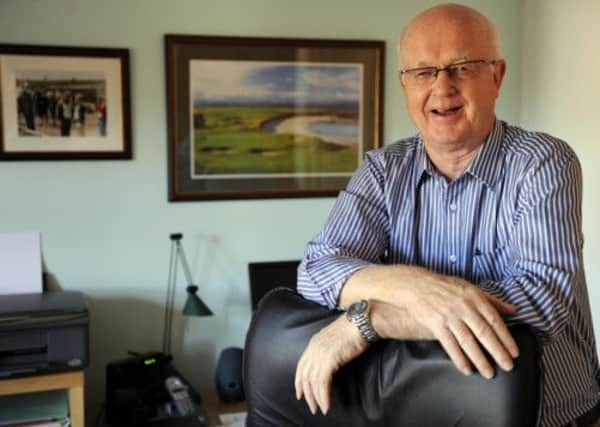Archie Macpherson tells of kidney cancer battle


Archie Macpherson, regarded by many as the voice of Scottish football, described his shock after it emerged he had been diagnosed with what he called a “sleekit kind” of cancer after a life spent in smoke-filled press boxes and editorial offices.
The 78-year-old was diagnosed six months ago after abnormalities were detected in a urine sample during a check-up. He has since undergone surgery at Monklands Hospital to remove the tumour – which saw him lose one healthy kidney and part of his second kidney – and has been given the all-clear.
Advertisement
Hide AdAdvertisement
Hide AdIn a newspaper article, the veteran commentator reflected on years spent “writing about overpaid, pampered footballers” and praised the “real heroes of the medical profession” who “saved my life”.
Macpherson, from Bothwell in Lanarkshire, said he decided to speak out about his experience to help raise awareness of issues surrounding cancer, contrasting his diagnosis with the death of his grandfather in an era when “ignorance and superstition kept cancer enshrouded in its evil Mephistophelean mystique”.
He explained: “My cancer was of the sleekit kind. It was coexisting with my sense of wellbeing and fitness, encouraging me to believe life was a pure dawdle. A simple, routine urine test indicated otherwise.
“For in the tube between bladder and kidney lay a limpet-mine of cancer. It could have been there for three to five years, according to my surgeon Ian Dunn, without any apparent sign of any debilitation and then had it been left without intervention, I would have been in trouble, big time.
“So out it had to come, pronto. The surgeon is not a man to mess about. He had to tell me that the surgery would be major and to the layman’s ears, drastic. ‘We may have to employ the bludgeon,’ he informed me. By that he meant that to get at the cancer and effect a cure, a perfectly healthy kidney and the tube to the bladder would have to be sacrificed.”
Macpherson, revered by generations of football fans for his commentaries for the BBC and STV, explained how he had never touched a cigarette in his life, and was told by medics that he was almost certainly a victim of passive smoking.
It was, he admitted, “not the congenial message about my fellow man I wished to learn as I was about to bid fond adieu to a healthy kidney”.
He added: “I had to add things up. As I am fond of a dram or two I had indeed spent many pleasant hours in howffs around the world with people around me creating the conditions of Auld Reekie at its worst.
Advertisement
Hide AdAdvertisement
Hide Ad“I could take you to a bar in Marseilles where, before the bans, I could sit happily for hours, as a non-smoker, naively savouring the almost exotic aroma of the wonderful Gauloises French cigarettes as innocently as breathing in the fragrance of a pine forest. I also worked blissfully in editorial offices and press boxes in the past which had the sulphuric stench of Hades about them, as I recall.”
He added: “My only plea is, well, I didnae ken. But I ken noo.”
Up to 7,000 people in the UK are diagnosed with kidney cancer every year, and Macpherson praised staff and surgeons at Monklands Hospital and across the wider medical profession for their response.
He explained: “Although my narrative will bring no solace to those who are suffering the worst depredations of cancer, hopefully it will encourage some to see the value of grappling with any uncertainties about their health in the knowledge that even in a harassed medical system, skills and care exist to take an early diagnosis and turn it into an affirmation of life, not its reverse.
“And even were it to mean you have to sacrifice an organ in the process, as in my case, or, like a woman opting for a pre-emptive double mastectomy, what you are being offered is the privilege of bartering with mortality. In such circumstances there is no such thing as a bad deal.”